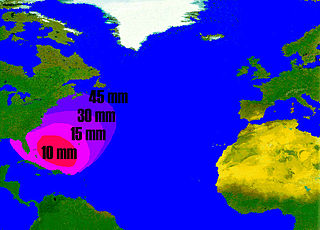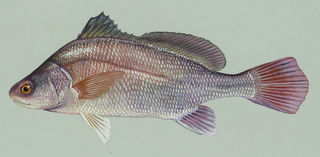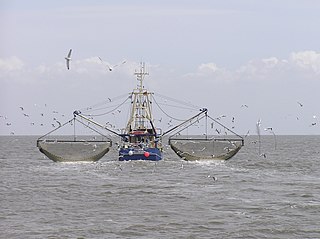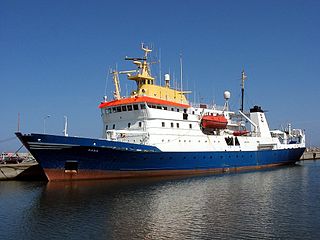
The eel is a long, thin bony fish of the order Anguilliformes. Because fishermen never caught anything they recognised as young eels, the life cycle of the eel was a mystery for a very long period of scientific history. Although more than 6500 publications mention eels, much of their life history remains an enigma.
FishBase is a global species database of fish species. It is the largest and most extensively accessed online database on adult finfish on the web. Over time it has "evolved into a dynamic and versatile ecological tool" that is widely cited in scholarly publications.

The Atlantic salmon is a species of ray-finned fish in the family Salmonidae. It is found in the northern Atlantic Ocean, in rivers that flow into the north Atlantic and, due to human introduction, in the north Pacific Ocean. Atlantic salmon have long been the target of recreational and commercial fishing, and this, as well as habitat destruction, has reduced their numbers significantly; the species is the subject of conservation efforts in several countries.

Arctic char or Arctic charr is a cold-water fish in the family Salmonidae, native to alpine lakes and arctic and subarctic coastal waters. Its distribution is circumpolar. It spawns in fresh water and populations can be lacustrine, riverine or anadromous, where they return from the ocean to their fresh water birth rivers to spawn. No other freshwater fish is found as far north; it is, for instance, the only fish species in Lake Hazen on Ellesmere Island in the Canadian Arctic. It is one of the rarest fish species in Britain and Ireland, found mainly in deep, cold, glacial lakes, and is at risk from acidification. In other parts of its range, such as the Nordic countries, it is much more common, and is fished extensively. In Siberia, it is known as golets and it has been introduced in lakes where it sometimes threatens less hardy endemic species, such as the small-mouth char and the long-finned char in Elgygytgyn Lake.
Hydrobiology is the science of life and life processes in water. Much of modern hydrobiology can be viewed as a sub-discipline of ecology but the sphere of hydrobiology includes taxonomy, economic biology, industrial biology, morphology, physiology etc. The one distinguishing aspect is that all relate to aquatic organisms. Much work is closely related to limnology and can be divided into lotic system ecology and lentic system ecology.

The freshwater drum, Aplodinotus grunniens, is a fish endemic to North and Central America. It is the only species in the genus Aplodinotus. The freshwater drum is a member of the family Sciaenidae, and is the only North American member of the group that inhabits freshwater for its entire life. Its generic name, Aplodinotus, comes from Greek meaning "single back", and the specific epithet, grunniens, comes from a Latin word meaning "grunting". It is given to it because of the grunting noise that mature males make. This noise comes from a special set of muscles within the body cavity that vibrate against the swim bladder. The purpose of the grunting is unknown, but due to it being present in only mature males, it is assumed to be linked to spawning.

A fishery is an area with an associated fish or aquatic population which is harvested for its commercial value. Fisheries can be marine (saltwater) or freshwater. They can also be wild or farmed.
David William Schindler,, is an American/Canadian limnologist. He holds the Killam Memorial Chair and is Professor of Ecology in the Department of Biological Sciences at the University of Alberta in Edmonton, Alberta. He is notable for "innovative large-scale experiments" on whole lakes at the Experimental Lakes Area (ELA) which proved that "phosphorus controls the eutrophication in temperate lakes leading to the banning of phosphates in detergents. He is also known for his research on acid rain In 1989, Dr. Schindler moved from the ELA to continue his research at the University of Alberta in Edmonton, with studies into fresh water shortages and the effects of climate disruption on Canada's alpine and northern boreal ecosystems. Schindler's has earned him numerous national and international awards, including the Gerhard Herzberg Gold Medal, the First Stockholm Water Prize (1991), the Volvo Environment Prize (1998), and the Tyler Prize for Environmental Achievement (2006).

Rising ocean temperatures and ocean acidification are radically altering aquatic ecosystems. Climate change is modifying fish distribution and the productivity of marine and freshwater species. This has impacts on the sustainability of fisheries and aquaculture, on the livelihoods of the communities that depend on fisheries, and on the ability of the oceans to capture and store carbon. The effect of sea level rise means that coastal fishing communities are in the front line of climate change, while changing rainfall patterns and water use impact on inland (freshwater) fisheries and aquaculture. The full relationship between fisheries and climate change is difficult to explore due to the context of each fishery and the many pathways that climate change affects.

IISD Experimental Lakes Area is an internationally unique research station encompassing 58 formerly pristine freshwater lakes in Kenora District Ontario, Canada. Previously run by Fisheries and Oceans Canada, after being de-funded by the Canadian Federal Government, the facility is now managed and operated by the International Institute for Sustainable Development (IISD) and has a mandate to investigate the aquatic effects of a wide variety of stresses on lakes and their catchments. IISD-ELA uses the whole ecosystem approach and makes long-term, whole-lake investigations of freshwater focusing on eutrophication.

Ichthyoplankton are the eggs and larvae of fish. They are mostly found in the sunlit zone of the water column, less than 200 metres deep, which is sometimes called the epipelagic or photic zone. Ichthyoplankton are planktonic, meaning they cannot swim effectively under their own power, but must drift with the ocean currents. Fish eggs cannot swim at all, and are unambiguously planktonic. Early stage larvae swim poorly, but later stage larvae swim better and cease to be planktonic as they grow into juveniles. Fish larvae are part of the zooplankton that eat smaller plankton, while fish eggs carry their own food supply. Both eggs and larvae are themselves eaten by larger animals.
Raymond (Ray) John Heaphy Beverton, CBE, FRS was an important founder of fisheries science. He is best known for the book On the Dynamics of Exploited Fish Populations (1957) which he wrote with Sidney Holt. The book is a cornerstone of modern fisheries science and remains much used today. Beverton's life and achievements are described in detail in several obituaries written by prominent figures in fisheries science.
Rosemary Helen Lowe-McConnell was an English ichthyologist, ecologist, and limnologist known for research on tilapia and aquaculture. Working in the tropical waters of Africa and South America, Lowe-McConnell was a pioneer in the study of tropical fish ecology and an early adopter of the use of scuba diving for scientific research.
Jeffrey A. Hutchings is a Canadian-born fisheries scientist, Professor of Biology, and Izaak Walton Killam Memorial Chair in Fish, Fisheries, and Oceans at Dalhousie University. He is well known for his work on the evolution of fish life histories and on the collapse, recovery, and sustainable harvesting of marine fishes. In addition to being Chair of a 2012 Royal Society of Canada Expert Panel on Marine Biodiversity, he chaired Canada's national science body responsible, by law, for advising the Canadian federal Minister of the Environment on species at risk of extinction. Past-President and Co-Founder of the Canadian Society for Ecology and Evolution, he was elected Fellow of the Royal Society of Canada in 2015. In 2017, he was awarded the international A.G. Huntsman Award for Excellence in the Marine Sciences. He was elected Fellow of the Norwegian Academy of Science and Letters in 2018.

Steven J. Cooke is a Canadian biologist specializing in ecology and conservation physiology of fish. He is best known for his integrative work on fish physiology, behaviour, ecology, and human-dimensions to understand and solve complex environmental problems. He currently is a full professor and Canada Research Chair in Environmental Science and Biology at Carleton University and the Editor-in-Chief of the scientific journal Conservation Physiology.
Robert Henry Peters was a Canadian ecologist and limnologist that championed a predictive approach to science in order to make quantitative models relevant to public needs. He proposed that predictive limnology could be an effective tool for producing empirical models about relevant processes and organisms in lakes. He was a Professor in the Biology Department of McGill University, Montreal, Canada from 1974 to his death in 1996.

The Australian Society for Fish Biology is a professional organisation of fish and fisheries researchers. Founded in 1971, the society describes itself as a "professional, independent, non-profit, non-commercial and non-aligned organisation." The Australian Society for Fish Biology holds annual conferences for its members, sometimes in partnership with related organisations such as the Oceania Chondrichthyan Society and the Australian Society for Limnology. Former presidents of the society include Gerry Allen (1979-81), Julian Pepperell (1991-93) and Bronwyn Gillanders (2012-13).
Cecil von Bonde was a South African zoologist, fisheries scientist and oceanographer.











